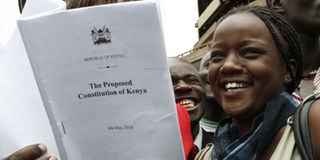What the Bill of Rights gives you

A lady smiles after receiving the published draft constitution on May 6, 2010 at the KICC. Photo/FREDRICK ONYANGO
It will be the government’s obligation to provide basic needs like food, water, housing and health if the proposed constitution is passed and adopted.
Under the Bill of Rights, the State will be tasked to put in place mechanisms for provision of the needs. And unlike in the current Constitution where the Bill of Rights only caters for political and civil liberties, the proposed law extends to economic and social rights essential for a reasonable standard of life.
The document gives the Kenya National Commission on Human Rights a broad mandate, including oversight of security agencies and powers to investigate maladministration and offer remedies.
The proposed constitution says that every person has the right to healthcare services. Furthermore, no person may be refused emergency medical treatment.
On education, it says every person has a right to education. The State is required to institute a programme to implement the right of every child to free and compulsory pre-primary, primary and secondary education and in so doing, shall pay particular attention to children with special needs.
On food, the document says every person has a right to be free from hunger and to adequate food of acceptable quality.
It adds that every person has the right to clean and safe water in adequate quantities. The proposed set of laws says every person has the right to life and that a person shall not be arbitrarily deprived of life.
Adequate housing
It states that every person has the right to accessible and adequate housing and to reasonable standards of sanitation. The State is to establish a housing development fund to enable Kenyans to gain access to better housing.
In an attempt to protect citizens, the document gives them the right to go to court. Citizens have the right to institute proceedings for enforcement of rights.
No fee will be charged for commencement of proceedings to redress rights or fundamental freedoms that have been denied. The document protects the rights, dignity and fundamental freedom of individuals and communities.
Unlike in the current Constitution, the right to life is specifically provided for. Abortion is clearly outlawed. Termination of pregnancy can only be allowed under emergencies, where a trained and qualified health professional determines if it is necessary.
The document says every adult has the right to marry a person of the opposite sex, based on the free consent of the parties.
Consumers have a right to goods and services of reasonable quality; information necessary for them to gain full benefit from goods and services; protection of their health, safety, and economic interests and compensation for loss or injury arising from defects in goods or services.
An arrested person has the right to be brought before a court as soon as reasonably possible, but not later than 24 hours after being arrested.
Remanded in custody
A person shall not be remanded in custody for an offence if it is punishable by a fine only or by imprisonment for not more than six months.
Every accused person has the right to a fair trial, which includes the right to have an advocate assigned to the accused person by the State.



